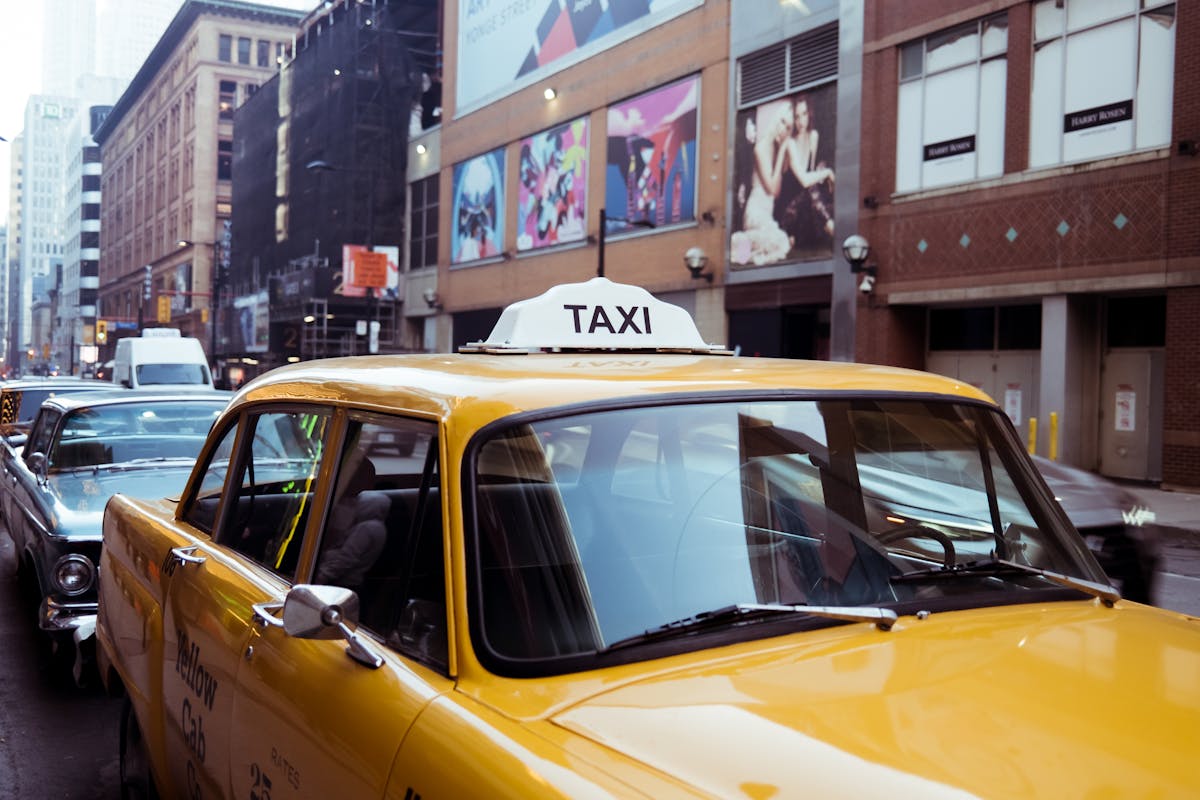Taxi Driver Wins Disability Discrimination Lawsuit
In a precedent-setting case, a taxi driver, Mr. James, won a disability discrimination lawsuit against his employer. The court ruled that the taxi company violated the Americans with Disabilities Act by failing to provide reasonable accommodations for his back injury and anxiety disorder. This decision not only fortifies the protections for disabled employees but also challenges the taxi industry to scrutinize and modify its existing policies to foster a more inclusive and equal working environment. This case raises thought-provoking questions about disability rights in the workplace that warrant further exploration.
The Case Background
Despite the common misconception, taxi driving can be a physically demanding job. This was the crux of a recent case that saw a taxi driver successfully sue for disability discrimination. The case details reveal a fascinating story of perseverance and justice.
The plaintiff, Mr. James, was a veteran taxi driver with over two decades of experience. His work entailed long hours of sitting, lifting heavy luggage, and dealing with the psychological stress of maneuvering through busy traffic. Over time, these physical and mental strains culminated in a debilitating back injury and severe anxiety disorder.
Mr. James’ employers refused to accommodate his disability, thereby prompting the lawsuit. His attorneys argued that his job requirements, coupled with his disability, placed him in an untenable situation that contravened the American Disabilities Act (ADA). The plaintiff’s background as a committed and long-serving employee added further weight to his case.
This lawsuit underscores the inherent physical demands of taxi driving, highlighting the need for employers to recognize and accommodate employees’ disabilities. It also serves as a reminder of the legal protections offered to disabled workers under the ADA. An analytical, objective, and detailed examination of this case yields important insights about workplace discrimination and the rights of disabled employees.
Plaintiff’s Arguments
The plaintiff presented a compelling argument centered on disability discrimination claims, which was a significant factor in the eventual outcome of the lawsuit. The legal battle, filled with notable highlights, ultimately led to the taxi driver’s victory. To fully appreciate the impact of this verdict, a detailed analysis of these arguments and their corresponding effects on the case’s resolution will be undertaken.
Disability Discrimination Claims
While examining the plaintiff’s arguments, it is clear that the taxi driver, who had been suffering from a physical disability, became a victim of discrimination as per the allegations filed in the lawsuit. The plaintiff’s claim centres around the allegation that his employer failed to make reasonable adjustments to accommodate his physical condition, a key requirement under disability awareness and rights.
This case underlines the important role of discrimination education in the workplace. Employers must take steps to guarantee that they are aware of their obligations under the law and that employees fully understand their rights and responsibilities. It isn’t enough to merely have policies in place; these must be properly communicated and implemented.
The plaintiff also alleges that his employer did not adequately address his concerns when brought forward, which constitutes a breach of duty of care. The driver’s job performance was unfairly assessed, leading to his unjust dismissal. This, the plaintiff argues, demonstrates a clear instance of disability discrimination.
Legal Battle Highlights
In the legal battle that ensued, the plaintiff’s arguments greatly illuminated the issues at hand. The taxi driver’s legal team utilized a number of legal strategies to highlight the importance of workplace inclusivity and the rights of disabled individuals.
The plaintiff’s arguments can be broken down into four key points:
- Violation of the Disability Discrimination Act: The plaintiff argued that the employer failed to provide reasonable accommodations for his disability, thereby violating the Disability Discrimination Act.
- Lack of Workplace Inclusivity: The driver’s legal team emphasized the lack of efforts to create an inclusive environment for employees with disabilities.
- Direct Discrimination: The plaintiff’s team argued that the driver had been subjected to direct discrimination due to his disability.
- Failure to Adhere to Legal Obligations: The legal team pointed to the employer’s failure to adhere to their obligations under the law, including the provision of appropriate disability training and policies.
These arguments highlighted the systematic issues within the company and the broader industry, as well as the need for improved workplace inclusivity and protection for disabled workers.
Verdict’s Impact Analysis
Through the lens of the landmark verdict in this case, one can discern the potential implications it might have on future disability lawsuits and the broader taxi industry. The ruling, favoring the plaintiff, can restructure industry standards, compelling companies to reevaluate their policies towards disabled employees.
The verdict implications are multi-faceted. On one hand, it emphasizes the importance of inclusivity and equality in the workplace, sending a strong message to other companies in the taxi industry. They may now need to proactively revise their approach to avoid future litigations, ensuring their practices comply with disability rights. On the other hand, this could also establish a precedent for future disability lawsuits, especially in industries where physical abilities are deemed critical for job performance.
The plaintiff’s arguments, centered on discrimination and lack of reasonable accommodations, have set a clear benchmark for what is considered unacceptable in employment practices. This could potentially influence how courts interpret and apply the law in forthcoming cases involving disability discrimination. The case, consequently, could serve as a turning point, pushing the taxi industry towards more accommodating, non-discriminatory practices, while shaping the dynamics of future disability lawsuits.
Defendant’s Counterclaims
Several counterclaims were raised by the defendant in response to the taxi driver’s lawsuit. The defendant’s strategy was to refute the plaintiff’s allegations of disability discrimination, arguing that the taxi driver was not subjected to unfair treatment due to his disability.
In a detailed counterclaims analysis, four key areas were identified in the defendant’s response:
- Asserting the taxi driver had not sufficiently demonstrated that his disability was the reason for the alleged discrimination, thereby questioning the validity of the claim.
- Challenging the taxi driver’s assertion that he had been subjected to unfair treatment, by presenting evidence of the company’s non-discriminatory policies and practices.
- Arguing that any perceived unfair treatment was not due to the driver’s disability, but rather, was a result of his performance issues.
- Claiming that reasonable adjustments had been made to accommodate the taxi driver’s disability, in line with legal requirements.
These counterclaims highlight the defendant’s attempt to disentangle themselves from allegations of disability discrimination. Their strategy was to undermine the plaintiff’s case, casting doubt on the veracity of the accusations. However, the effectiveness of these counterclaims was ultimately determined by the court.

Court’s Decisions
Despite the defendant’s concerted efforts to debunk the allegations of disability discrimination, the court arrived at a different conclusion. The court’s decision was based on a detailed examination of the evidence presented, as well as thorough judicial reasoning. The judges weighed the facts of the case against relevant court precedents, resulting in a verdict in favor of the plaintiff.
The court found that the taxi company’s practices violated the guidelines established by prior court rulings, which clearly outline the responsibilities of employers towards disabled employees. It was concluded that the defendant failed to provide reasonable accommodations for the plaintiff, a clear violation of disability discrimination laws.
The judicial reasoning was grounded in the principle of equality and non-discrimination. The court underscored that no person, irrespective of their disability, should be denied equal employment opportunities. The court demonstrated its commitment to uphold the rights of individuals with disabilities, thereby reinforcing its stance against discriminatory practices.
Thus, the court’s decisions were not only a victory for the plaintiff but also reaffirmed the legal principles protecting disabled individuals from workplace discrimination. The court’s commitment to uphold these principles sends a clear message to all employers about the importance of inclusivity and equality in the workplace.
Implications for the Taxi Industry
The recent court decision has notable implications for the taxi industry, particularly regarding legal impact on businesses, driver rights and regulations, and changes in hiring policies. It necessitates a thorough examination of existing practices and potential amendments to guarantee compliance with disability rights. This case could potentially serve as a precedent, prompting taxi companies to reconsider their approach towards the treatment and inclusion of drivers with disabilities.
Legal Impact on Businesses
Often, landmark legal outcomes such as the recent victory of a taxi driver in a disability lawsuit can have far-reaching impacts on the industry at large. This case serves as a stark reminder of business liability and the importance of workplace inclusivity, potentially prompting significant changes in the taxi industry.
The key implications include:
- Increased Business Liability: Businesses may face greater liability risks, necessitating enhanced insurance coverage and risk management strategies.
- Emphasis on Workplace Inclusivity: This ruling underscores the importance of creating an inclusive workplace that accommodates all employees, regardless of disability status.
- Policy Changes: The taxi industry, in particular, may need to revise their policies to guarantee they do not discriminate against drivers with disabilities.
- Legal Scrutiny: This case could lead to more rigorous legal scrutiny of businesses, particularly those in the public transportation sector, regarding their treatment of disabled employees.
Driver Rights and Regulations
Maneuvering the labyrinth of driver rights and regulations, the implications of this landmark lawsuit for the taxi industry are manifold. Paramount among these are enhanced driver protections and a renewed emphasis on employment rights.
The lawsuit has highlighted the necessity of stringent driver protections within the taxi industry. It underscores the principle that these protections are not just theoretical but must be actively enforced to guarantee a fair and equitable working environment. The industry must respond by guaranteeing that its policies and practices comply with the law, reducing the likelihood of future litigation and protecting the rights of disabled drivers.
Employment rights, too, have been brought into sharp focus. The court’s ruling sends a clear message that discrimination, whether based on disability or any other protected characteristic, will not be tolerated. The industry must now demonstrate its commitment to these rights by guaranteeing equal opportunities for all drivers, irrespective of their personal circumstances.
Changes in Hiring Policies
As we consider the profound implications of the court’s ruling on driver rights and regulations, it naturally leads us to examine the potential changes in hiring policies within the taxi industry. It is evident that the ruling may act as a catalyst for significant policy reforms that prioritize inclusive hiring.
- Increased Diversity: The taxi industry may need to revise its hiring policies to accommodate a more diverse workforce, including individuals with disabilities. The court’s decision could drive this change, promoting inclusivity and diversity in the industry.
- Policy Reforms: Changes may include modifications to job descriptions, performance expectations, and accommodation policies. These reforms could guarantee that the rights of all potential employees are respected and protected.
- Training Programs: The industry could develop training programs to educate existing staff about inclusivity, disability rights, and the changes in hiring policies. This could foster a more understanding and accommodating work environment.
- Legal Compliance: Taxi companies may need to verify that their hiring policies are in line with local, state, and federal laws pertaining to disability rights and nondiscrimination.
In essence, the ruling signifies a broader, systemic shift towards inclusive hiring practices, which could reshape the landscape of the taxi industry.
Future Impact on Disability Discrimination Laws
The landmark victory of the taxi driver in the disability lawsuit is poised to have far-reaching implications on disability discrimination laws. This case will certainly set a significant legal precedent, offering a beacon of hope for people with disabilities facing discrimination in the workplace.
The result of the lawsuit is not only a triumph for the taxi driver, but a victory for disability rights as a whole. It draws attention to the urgent need for inclusive, accessible workplaces. This win could potentially lead to a detailed review and substantial overhaul of existing disability discrimination laws, prompting legislators to guarantee that they adequately protect individuals with disabilities in the workplace and beyond.
One should not underestimate the potential ripple effect this victory could have. By reinforcing legal precedents, the case could inspire other individuals experiencing disability discrimination to take legal action, potentially leading to more robust and extensive laws in the future.
In essence, this ruling could serve as a catalyst for change in how disability discrimination is addressed legally. It underscores the importance of disability rights and reinforces the need for workplaces to be inclusive and accessible for all, irrespective of physical abilities.
Frequently Asked Questions
What Is the Taxi Drivers Personal Experience Living With a Disability?
The taxi driver, living with a disability, faces daily obstacles and accessibility challenges. His experience reflects a constant struggle for inclusivity and equal opportunities, highlighting societal barriers that hinder the full participation of disabled individuals in everyday activities.
How Did the Taxi Drivers Colleagues React to His Disability?
In traversing the tumultuous seas of workplace dynamics, the taxi driver found varied responses. Some colleagues exhibited commendable support, an oasis in a desert, while others contributed to a hostile environment, highlighting complex disability discrimination issues.
What Kind of Support Does the Taxi Driver Have Outside of Work?
The taxi driver benefits from extensive community support and significant family involvement. These networks have been instrumental in providing emotional and practical assistance, helping him navigate the challenges posed by his disability outside the workplace.
How Has the Lawsuit Affected the Taxi Drivers Personal Life?
The lawsuit’s resolution has had profound legal implications, altering the driver’s personal landscape. Beyond the legal sphere, the emotional impact has been significant, fostering a sense of empowerment and justice in his everyday life.
What Are the Taxi Drivers Future Career Plans After Winning the Lawsuit?
The individual’s future aspirations post-litigation focus on a career shift. Empowered by the legal victory, they plan to leverage this experience to advocate for disability rights in the transportation sector, combining personal interests with professional endeavors.






